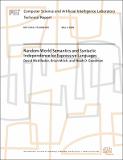Random-World Semantics and Syntactic Independence for Expressive Languages
Author(s)
McAllester, David; Milch, Brian; Goodman, Noah D.
DownloadMIT-CSAIL-TR-2008-025.pdf (220.2Kb)
Additional downloads
Other Contributors
Learning and Intelligent Systems
Advisor
Leslie Kaelbling
Metadata
Show full item recordAbstract
We consider three desiderata for a language combining logic and probability: logical expressivity, random-world semantics, and the existence of a useful syntactic condition for probabilistic independence. Achieving these three desiderata simultaneously is nontrivial. Expressivity can be achieved by using a formalism similar to a programming language, but standard approaches to combining programming languages with probabilities sacrifice random-world semantics. Naive approaches to restoring random-world semantics undermine syntactic independence criteria. Our main result is a syntactic independence criterion that holds for a broad class of highly expressive logics under random-world semantics. We explore various examples including Bayesian networks, probabilistic context-free grammars, and an example from Mendelian genetics. Our independence criterion supports a case-factor inference technique that reproduces both variable elimination for BNs and the inside algorithm for PCFGs.
Date issued
2008-05-03Other identifiers
MIT-CSAIL-TR-2008-025
Collections
The following license files are associated with this item: